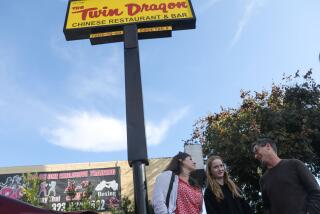China Jews Settle in Old Imperial Capital : Hundreds of Chinese Jews Live in Old Imperial Capital, Ancient Center of Judaism
- Share via
KAIFENG, China — When residents of North and South Scripture Lane see a foreigner wandering down their alley, they can guess why.
“Are you looking for descendants of the Jews?” asked an old man sitting beside the dirt lane in his undershirt, and told the visitor about Li, who lives a few streets away.
He waved a hand toward where Zhao lives, but would not take the stranger there. “He’s not accepting visitors anymore,” the old man said. “He’s had too many.”
Zhao Pingyu, 68, is one of a few hundred descendants of Jews living in this ancient center of Judaism, 390 miles from Beijing in Henan province.
Kaifeng, the imperial capital from the 10th to the 13th Century, once was home to thousands of Jews, but they gradually became so assimilated that little is left to distinguish them except their memories and stories.
In the 1980s, as China opened to the outside world, Kaifeng officials sought to cash in on the mystique of Jews in China to draw attract tourists. Their attitude appears to have changed since the crackdown last year on “bourgeois liberalism,” the catch phrase for Western ideas.
When a New York family held a bat mitzvah in Kaifeng in July for their daughter’s coming of age, their requests for permission to invite the local Jewish community were ignored.
Zhao said the Kaifeng foreign affairs office had told him not to receive foreigners except at official receptions, then he added: “But if people come on their own to my house, how can I not invite them in? That would be inhospitable.”
Although neighbors are reluctant to take people to Zhao, visitors have little trouble finding him. Zhao is well-known in Kaifeng because he is one of the few Jews with knowledge of Jewish history and culture.
He lives with his wife, a non-Jew, in a large room at the back of a courtyard on South Scripture Lane that once was part of the synagogue compound.
The synagogue was built in 1163 and stood for 700 years through 10 renovations. It eventually was destroyed by flooding from the Yellow River, and the No. 4 People’s Hospital now stands on the site.
Zhao has a diagram of the synagogue, which his great-great-grandfather restored after retiring from an imperial court office.
A few years ago, after his own retirement from the tax bureau, Zhao started building a model of the synagogue, which included three elaborate worship halls and several side buildings. Much work still remains.
One of the three stone tablets displayed in Kaifeng’s museum exhibit on Jews in China came from Zhao’s family. The tablets are the Jews’ best historical record.
Jewish merchants arrived in China in the 7th Century, joining other traders on the journey along the Silk Road or by sea from south India.
Thousands settled in Kaifeng, eventually creating China’s largest Jewish community and the one that lasted longest. As recently as 200 years ago, 2,000 to 3,000 Jews worshiped weekly in the Kaifeng’s synagogue.
By the mid-19th Century, the Jews had intermarried and become assimilated. They adopted the customs of the majority Han Chinese or the Muslims, forgot the Hebrew language and took Chinese names.
A survey of Kaifeng in 1980 found only 79 Jewish families with 166 members. Other accounts say Kaifeng’s population of 500,000 includes up to 300 descendants of Jews.
Zhao and other Jews in the old imperial capital do not observe Jewish rituals or holidays, but he remembers eating unleavened bread for the Passover meal as a child. Many Chinese Jews observed Passover during the Chinese Lunar New Year.
Even though he does not practice Judaism, Zhao maintains his sense of Jewish identity.
“When the Jews come here from foreign countries, I feel there’s some connection, some relationship by blood,” he said. “They’re our friends and our brothers.”
Zhao’s household registration lists him as a Jew, but his new citizen identification card says says he is Han Chinese.
China has 54 minority groups. It does not recognize Jews as a minority because they no longer have a language or customs to distinguish them from Han Chinese.
More to Read
Sign up for Essential California
The most important California stories and recommendations in your inbox every morning.
You may occasionally receive promotional content from the Los Angeles Times.













